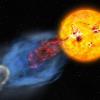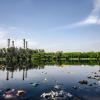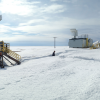News Headlines
 Marking its 75th anniversary this autumn, "The Lion, the Witch and the Wardrobe" has become a cultural touchstone for fantasy and faith, says Professor Deborah Whitehead.
Marking its 75th anniversary this autumn, "The Lion, the Witch and the Wardrobe" has become a cultural touchstone for fantasy and faith, says Professor Deborah Whitehead. New research co-authored by CU Boulder shows, when it comes to green behavior, messages that emphasize being an environmental person, instead of guilt, lead to greater environmental behavior choices in the future.
New research co-authored by CU Boulder shows, when it comes to green behavior, messages that emphasize being an environmental person, instead of guilt, lead to greater environmental behavior choices in the future. In a capstone project partnership with the Boulder Watershed Collective, Masters of the Environment students learn what it means to live alongside beavers.
In a capstone project partnership with the Boulder Watershed Collective, Masters of the Environment students learn what it means to live alongside beavers. Children aren't just blank slates—they create meaning from the media they experience. An expert says that's a reason to think about how we show themes such as violence and death.
Children aren't just blank slates—they create meaning from the media they experience. An expert says that's a reason to think about how we show themes such as violence and death. Singles are reshaping culture and commerce in Asia. CU expert Peter McGraw explains why the U.S. could be next—read on The Conversation.
Singles are reshaping culture and commerce in Asia. CU expert Peter McGraw explains why the U.S. could be next—read on The Conversation. International researchers, including several from CU Boulder's LASP, have reported the first evidence of a coronal mass ejection carrying both hot and cool plasma from a young star—suggesting such ejections from the early sun may have affected the chemistry of Earth's atmosphere and the emergence and evolution of life on Earth.
International researchers, including several from CU Boulder's LASP, have reported the first evidence of a coronal mass ejection carrying both hot and cool plasma from a young star—suggesting such ejections from the early sun may have affected the chemistry of Earth's atmosphere and the emergence and evolution of life on Earth. A global analysis found that almost everyone on Earth experiences at least one poor environmental condition, with the greatest burdens falling on low-income and Indigenous communities.
A global analysis found that almost everyone on Earth experiences at least one poor environmental condition, with the greatest burdens falling on low-income and Indigenous communities. A new international study sheds light on why the 55-and-older set tends to share more fake news on social media—and what can be done about it.
A new international study sheds light on why the 55-and-older set tends to share more fake news on social media—and what can be done about it. Ground-based measurements from Alaska's North Slope offer a new perspective on how changing Arctic clouds impact rising temperatures on Earth's surface.
Ground-based measurements from Alaska's North Slope offer a new perspective on how changing Arctic clouds impact rising temperatures on Earth's surface. CU Boulder political scientist Michelangelo Landgrave's research finds Republicans and independents share Democrats' concerns over corporate donations in federal elections.
CU Boulder political scientist Michelangelo Landgrave's research finds Republicans and independents share Democrats' concerns over corporate donations in federal elections.


